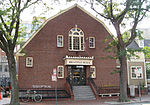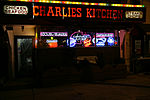Cambridge Center for Adult Education
Adult education in the United StatesCambridge, MassachusettsEducation in Middlesex County, MassachusettsOrganizations based in Cambridge, Massachusetts

The Cambridge Center for Adult Education (CCAE), a non-profit corporation in Cambridge, Massachusetts, has been teaching adult education courses at 42 Brattle Street since taking over the building from the Cambridge Social Union in 1938.The CCAE is housed in two historic buildings, the William Brattle House (1727) at 42 Brattle Street and the Dexter Pratt House (1808) at 54 Brattle Street.
Excerpt from the Wikipedia article Cambridge Center for Adult Education (License: CC BY-SA 3.0, Authors, Images).Cambridge Center for Adult Education
Brattle Street, Cambridge
Geographical coordinates (GPS) Address Nearby Places Show on map
Geographical coordinates (GPS)
| Latitude | Longitude |
|---|---|
| N 42.373694444444 ° | E -71.121555555556 ° |
Address
Brattle Street 42
02163 Cambridge
Massachusetts, United States
Open on Google Maps







